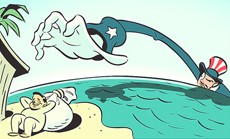Income Tax: audit Income Tax IRS US Tax
by admin
Comments Off on 2012 Offshore Voluntary Disclosure Initiative Announced by IRS
2012 Offshore Voluntary Disclosure Initiative Announced by IRS
If you have to file US tax returns, doing nothing is no longer an option. You have to file a US Tax Return, if you are,1. A USA Citizen
2. A Dual USA Citizen Living Abroad
3. A USA Resident
4. A USA Green Card Holder Living Abroad
United States Internal Revenue Service (IRS) has been aggressively pursuing US persons (including US citizens and green-card holders living abroad) who have failed to report foreign income on their US income-tax returns and/or failed to report foreign bank and investment accounts on a Foreign Bank Account Report (FBAR). A US Person, must file income tax return with IRS, regardless of their residency.
IRS implemented amnesty programs since 2009 for US citizens to come forward with their foreign income reporting. More than 30,000 people have voluntarily complied since 2009, at least 30 have been criminally indicted and the IRS has netted a total of $4.4 billion in unpaid taxes, interest and penalties.
The State Department estimates that more than 6 million citizens live overseas, excluding those in the military, yet the IRS receives only 1.6 million tax returns each year with foreign addresses. And just over 500,000 FBARs were filed in 2009.
On January 9, 2012 the IRS announced a third amnesty, formally known as the Offshore Voluntary Disclosure Program. It is substantially the same as the 2011 amnesty (aka 2011 OVDI), with some exceptions:
(1) There is no deadline to apply to the program, although the IRS reserves the right to change the terms at any time going forward. For example, they state they have the right to increase the penalties.
(2) The top penalty is 27.5 percent (increased from 25%) of the highest aggregate balance in foreign bank accounts/entities or value of foreign assets during the eight full tax years prior to disclosure. If you disclose in 2012, you must include 2004- 2011.
(3) Some people will be eligible for a lower penalty of either 12.5% or 5%, which is the same as the 2011 amnesty.
For many US citizens living in Canada, the third amnesty may still be the best way to resolve delinquent tax issues. If accepted, there is no criminal prosecution and you know going into the program what it will cost you. If you do not use the program, you have the uncertainty of the final amounts due.
Starting with the 2011 US income-tax return, you must now attach a new Form 8938 to disclose all Foreign Financial Assets (FFA). For those living in a foreign country, this form is required if your FFA exceeds: (a) if not filing a joint return, $200,000 on the last day of the year, or $300,000 at any time during the year; (b) if filing a joint return, $400,000 on the last day of the year, or $600,000 at any time during the year. Failure to file a complete and correct Form 8938 by the due date of the return can be subject to a penalty of $10,000.
Also starting with the 2011 US tax return, there is now a separate line in the address section to report the foreign country in which you live. Similarly, you must now answer yes to the question on Schedule B (Interest and Dividend Income) that you have a financial interest or signature authority in a foreign account even if the aggregate balance is less than $10,000.
Starting in 2013, under FATCA rules, every bank in the world will have to have a written agreement with the IRS to furnish information about accounts held by US citizens. If the bank does not comply, it will suffer certain monetary penalties and possible criminal prosecution. The information will include your name, address, US Social Security number and all the transactions in the account.
For USA residents and US-Canada dual citizens who have not reported foreign-source income and assets, there is a short window to come clean in both countries. We have helped many US taxpayers in Vancouver to comply with 2011 IRS OVDI.
